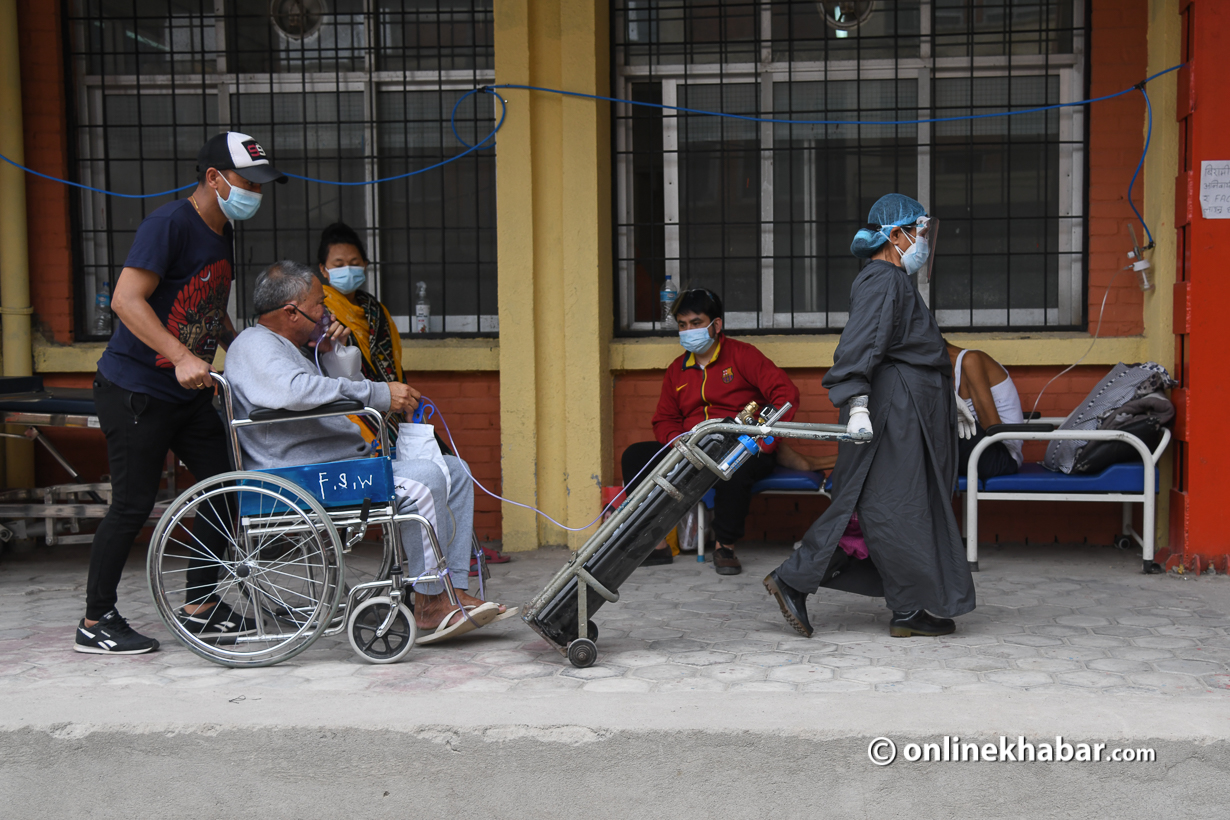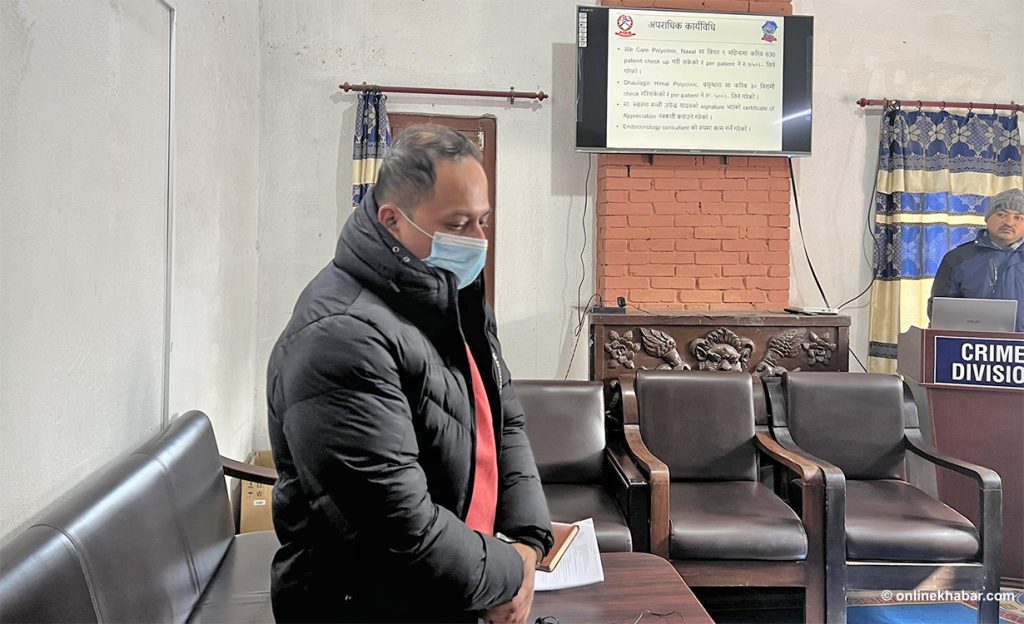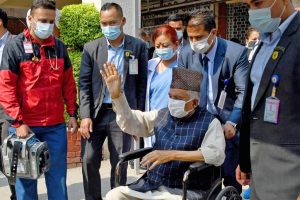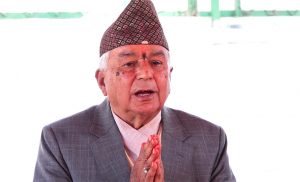At the emergency ward of the Tribhuvan University Teaching Hospital, a 62-year-old Covid-19 patient is struggling to survive. When he tries to move his oxygen mask with his hand, he suddenly falls off his bed. A nurse seeing his plight consoles the patient, placing him back to bed, “You’re getting better, buba. Try to be calm, buba. We will soon shift you to the ICU.”
The nurse, realising that anything could happen to him any time due to his declining oxygen levels and other chronic diseases, writes a note that he has to be transferred to the ICU as soon as possible and hands over that note to on-duty Dr Suman Acharya. However, the ICU beds at the hospital are not empty as mentioned in the statistics of the Ministry of Health.
While searching for an ICU bed for him, outside, dozens of Covid-19 patients are waiting for ICU beds to be empty. Dr Niraj Bam, a senior pulmonologist, who is actively working for the Covi19 management in the hospital, says, “Any infected person must die or be discharged for an ICU bed to be empty. There are more than five critically ill patients who must be admitted to the ICU waiting for one or two patient to die. This is such a distressing situation.”

Despite the situation, health workers at one of the biggest hospitals of the Kathmandu valley are work doing their best every day and night to give a new lease of life to as many patients as possible.
Hard choices
In front of the ICU, some relatives of the infected are arguing with the health workers. Their demand is to give oxygen brought by them to their patients. After a while, Bam and other health workers calm them down.
Inside the ICU, the rush of nurses clearly reflects the severe situation there. A nurse is consulting a doctor on whether to take out a recovering patient and keep another critically ill elderly man in the ICU.
More than 370 Covid-19 patients are being treated at the teaching hospital. Even after establishing Covid-19 treatment wards in all the departments, the hospital could not accommodate all the patients coming here, laments Bam.
“Even in this situation when we have to hear screams and witness deaths, our health workers have not refused to work,” says Bam, “The main problem is the shortage of the empty beds.”

According to him, when five patients need the ICU beds, barely two beds are available. In this case, the patients are admitted to the ICU depending on the complexity, age and chronic diseases. “Many Covid-19 patients died last week due to the lack of beds and oxygen,” reports Bam, “The listener may not like to hear this, but here the priority is given to those who are comparatively young.”
Moral crisis
“There are two sick people of the same age, but only one bed in the ICU is empty,” Dr Suman Acharya, who is on 24-hour duty in the emergency ward, questions, “In such a situation, whom to save and whom to leave to die?”
Acharya, who behaves friendly with everyone even in the midst of the rush to accommodate those waiting in line outside by shifting the patients in the emergency ward to the other wards, opens up, “But, due to the shortage of beds, some Covid-19 patients can’t be saved. And, every such death shakes us from within and makes us feel helpless and guilty.”
However, for health workers working in the Covid-19 ward, seeing the death of a Covid-19 patient has become a common occurrence as they are having to witness the demise of four to five people daily. And, Acharya shares, “It is very troublesome to witness all of this.”
Narayani Gautam, the nursing in charge of the Covid-19 ward in the hospital, also expresses the same feeling, “We have to act strong from outside even if our heart is shattered witnessing the demise of the patients.”
Working under pressure
Every health worker working for the treatment of Covid-19 patients gets goosebumps when they remember their family. Even if they are vaccinated, the jabs have become a far-fetched thing for their family members.

Binita Luitel, a nurse working in the emergency ward, says she has to stay away from her two-and-a-half-year-old child due to the fear of spreading the virus to the child and other family members. “I can’t even quit my job now,” she opens up “Who will care for the sick when the health workers run away from their duty during this pandemic?”
According to Luitel, nurses are the ones who serve the patients most closely. They are the ones who give medicine and oxygen and make the patients sleep and wake up.
“And, it is very painful to witness the last breath of a human life,” she expresses, “Meanwhile, the gratitude and happiness on the faces of those who come to thank you after their recovery are so soothing and pleasing.”
Another nurse in the same ward, Barsha Khawas, who is also a mother of a 16-month-old baby shares similar experiences as Luitel. She says, “I live in a joint family and my child receives a lot of care from all. But still, I need to breastfeed him. And, that has become so tough now.”
Kamala Shrestha, a cleaning staff of the hospital for 10 years, spends most of her time cleaning up and shifting patients. As she works mainly in an emergency ward and the ICU, she also needs to wrap the dead people. “Looking at the bodies, I feel like if only this person was not infected with the coronavirus, their family and relatives could have touched them and looked at them,” she grimaces.

Shrestha, who has been working at risk since the pandemic hit Nepal, has a salary of Rs 13,500. But, she has not received the risk allowance. But still, she does her duty diligently. The hospital is short of beds and health workers as well as cleaners. When the team is small, the workload becomes more. She says, “If we just focus on the salary, there will be chaos here immediately.”
Her mother has asthma. She hence fears going home as it could infect her mother but still has to g because the hospital has not managed any facility to stay there for its front liners. “There are a lot of health workers who wish not to go home after completing the duty hours due to the fear of spreading the infection.”
Hospital front liners across the country are facing the same problem. Those working under pressure due to the lack of human resources are underpaid. There is no allowance and housing facility even if you work at high risk.
But, the government seems unaware of all these problems they are facing.
The problem continues..
Outside the emergency ward, Dr Suman Acharya is examining a newly arrived coronavirus infected. He is a 70-year-old asthma patient. As per Acharya, he has to undergo dialysis, after which, he requires an ICU bed.

“We have just shifted a 63-year old patient to the HDU. But, this elderly man is also critical. How to manage an ICU card for him now?” questions Acharya.
When we spent six hours at the emergency and ICU wards of the teaching hospital, we saw such distressing scenes. In what condition do the health workers who regularly witness these scenes work? They also cannot answer this. But, all we can say is, “Salute health workers!”


























